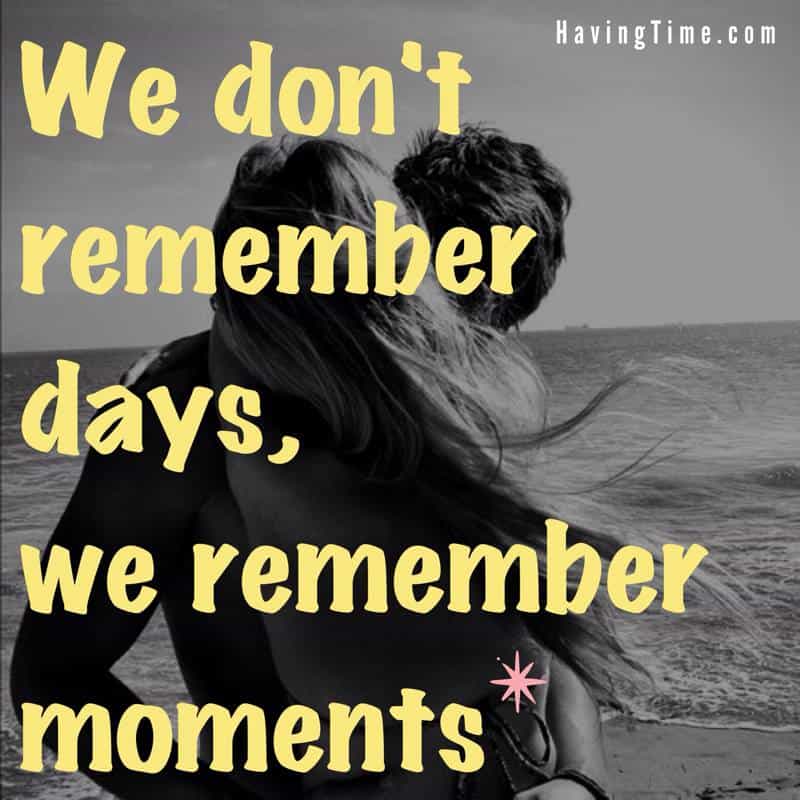Ultimately the bond of all companionship, whether in marriage
or in friendship, is a conversation. – Oscar Wilde

A few weeks ago, on a Friday evening ending a particularly stressful week, my husband and I found ourselves in one of those conversations that you should never be having on a Friday evening – especially after a stressful week. I don’t remember the exact details of the conversation now (which underscores just how unnecessary it was at the time), though I know it had something to do with dirty dishes in the sink, chores, bills, and the like. We weren’t angry, really, nor were we exactly fighting. All the same, this was not the kind of conversation that either of us had hoped to have as the week came to a close.
During this conversation, we weren’t focused on each other, and neither of us was left feeling understood or with more understanding of the other. There was no sharing of stories or connecting. We didn’t talk about how we wanted to spend time together over the weekend. There was no “thank you” or “I love you” in this conversation.
Somewhere between rehashing stressful (and irrelevant) topics and turning toward the television instead of one another, my husband asked, “So how was your day?”
We paused, looked at each other a second, and laughed sheepishly.
Somehow, we’d skipped this very basic part of coming together at the end of the day. How had we overlooked “how was your day” before getting to the bills? Were the dishes in the sink really more pressing than “I love you?”
Any of us might skip over what is truly important and get caught up in everything else. We may do this to problem solve or talk it out. Maybe we are sure that these issues are what really matter right now. Whatever our motivation, we often don’t feel more connected in the end.
We’ve probably all been told at one point or another that “relationships take work.” But what does this really mean? We may intuitively know that this is true, yet what we should be working on is not exactly intuitive.
Time and attention to the relationship and our partner can be confused with difficulties and struggle as we skip over the deceptively simple conversation that leaves us feeling understood, respected and cared for.
It often doesn’t begin this way. Probably for most of us, the beginning of a relationship is exciting and passionate. The conversation hooks us in. We want to learn everything about this new person. The dishes in the sink seem inconsequential as we talk all night about everything and nothing.
As this new person becomes a fixture in our daily life, however, we can lose sight of this. The long, exciting talks are replaced by discussing bills and chores. Sometimes, we may not even talk at all.
Of course, a relationship will not always be like it is at the beginning, but what is truly important does not change.
A healthy, vibrant relationship is one that leaves us feeling understood, respected, and appreciated. As long as we remain mindful of this, rather than skipping over it, these big feelings can be communicated in pretty simple ways.
Have you skipped saying these 6 things to your partner today?
“I Love You.”
It is important to express to our partner how important they are to us. The specific words don’t matter as much as the meaning behind them. Telling your partner that they matter and that you care feels good for you and for them. This also gives you a positive foundation upon which your relationship can grow, even in times of struggle.
“I Admire Your…”
What first attracted you to your partner? What is it about them that rounds out your rough edges or fills in your blanks? Sometimes we take these things for granted or even come to resent them. Tell your partner what you admire about them. Give examples of a time they demonstrated a particularly admirable or attractive quality. This feels good to say and to hear and quite often motivates your partner to express their admiration of your good qualities.
“Thank You”
Everyone wants to feel seen and appreciated. Tell your partner thank you for both big and little things they do. Not only does this feel validating to them, but it sets the stage for you to see them in an increasingly positive light. Like expressing appreciation, thank you can also be contagious. Your partner might just catch on and start acknowledging all that you do, too.
“Do You Remember When?”
Reminisce about how you met. Feel nostalgic together about an important time in your lives. Express gratitude for your partner helping you through a difficult time. When we look back at the past, even ordinary moments can take on a new meaning. Looking back fondly at the things we used to do and the people we used to know can expand our understanding and appreciation for our partner and our relationship.
“What are you looking forward to today/how did your day go?”
Stay up-to-date in your knowledge about your partner. Asking about their day or what they are looking forward to helps you maintain a current understanding of what is going on in his or her life. These questions also serve as anchors to the day. When you begin and end the day this way, checking in becomes a part of the day that both of you can look forward to.
“I Hear You”
When our partner is talking, we can try to jump in with a solution or opinion, yet all they may need is to be heard and understood. The solutions and problem-solving can come later. Validation comes first. We might skip over this for a variety of reasons. We might be distracted by our own physical or mental state. During difficult conversations, we might also be working on our argument while our partner is trying to convey his or her feelings. Tell your partner “I hear you,” check your understanding of what they just said, and find out what they need from you.


